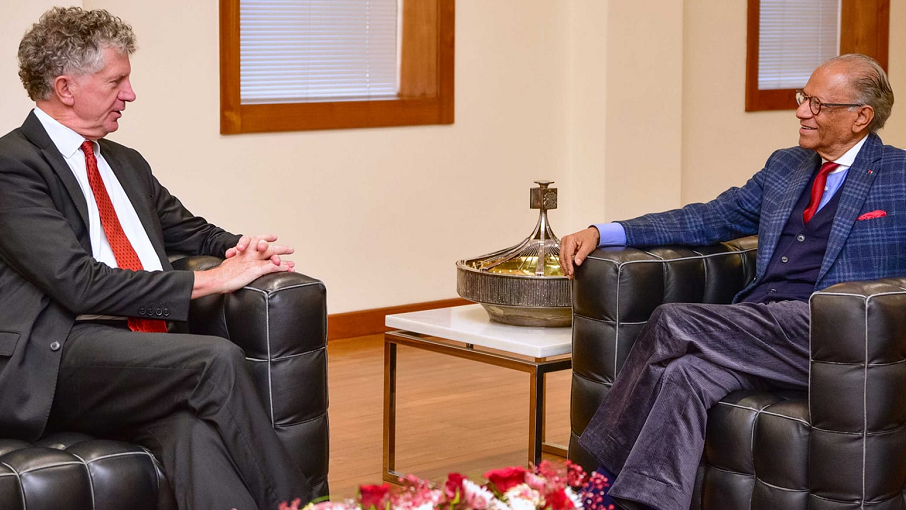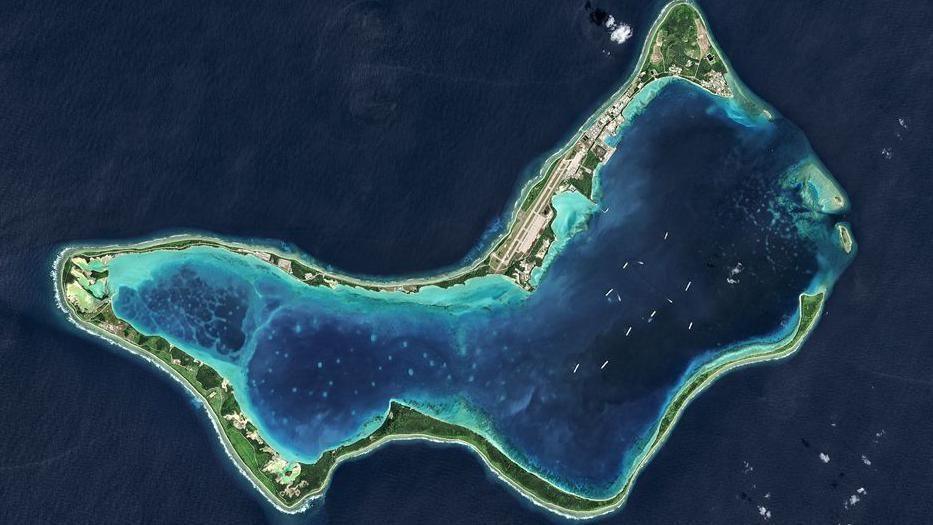New Mauritius PM has reservations about UK's Chagos deal

Mauritian Prime Minister Navinchandra Ramgoolam (R) held talks with British envoy Jonathan Powell (L) in Port Louis on Monday
- Published
The new prime minister of Mauritius has said he has reservations about the deal struck by his predecessor with the UK government last month over the Chagos Islands.
Under the deal, the UK would give up sovereignty over the remote but strategically important archipelago - while leasing Diego Garcia, home to a joint UK-US military base, for at least 99 years.
PM Navinchandra Ramgoolam, elected two weeks ago, did not outline his precise issues with the agreement, but a cabinet minister said there were problems with the lease arrangement.
It could also face opposition from US President-elect Donald Trump's administration.
The UK Foreign Office said the deal was "in both sides’ shared interests".
A spokesperson said this included "ensuring the long-term effective operation of the joint UK-US base on Diego Garcia".
They added that the accord had been welcomed by the US and India, and that the Foreign Office looked forward to working with the new Mauritian government to finalise the deal in a treaty.
Marco Rubio, Trump’s pick for secretary of state, has described the deal as a threat to US security.
When the deal was signed, after years of talks, UK Prime Minister Sir Keir Starmer and his then-Mauritian counterpart Pravind Jugnauth called it a "seminal moment in our relationship and a demonstration of our enduring commitment to the peaceful resolution of disputes and the rule of law".
UK opposition leader Kemi Badenoch accused the government of not knowing "how to defend our national interests" in its handling of the negotiations.
Some groups representing the interests of Chagossians have also expressed disquiet, saying they were excluded from the negotiations.
Prime Minister Ramgoolam expressed his doubts about the agreement after meeting Jonathan Powell, the UK's national security adviser, on Monday.
"I informed them that I wished to have more time to study the details with a panel of legal advisers," he said.
He also voiced surprise that the details were finalised just over a month before Mauritius's general election.
Mr Powell said that negotiations would continue and both sides agreed to reconvene in Mauritius in two weeks to report their progress.
In the election campaign, Ramgoolam and his allies in the Change coalition accused then-Prime Minister Jugnauth of "high treason", describing the agreement as a "sell-out" motivated by desperation ahead of the vote.
Arvin Boolell, the newly appointed minister of agro-industry and fisheries, has been more specific about the objections in his comments on Monday.
He criticised the former prime minister for granting the UK a long lease over Diego Garcia - he said it was 200 years, though the publicised timeframe was an initial period of 99 years.
"In other words," Boolell remarked to a newspaper, "the tenant has become the owner of Diego Garcia for 200 years."
In recent years, the UK has faced rising diplomatic isolation over its claim to what it refers to as the British Indian Ocean Territory, with various United Nations bodies - including its top court and general assembly - overwhelmingly siding with Mauritius and demanding the UK surrender what some have called its "last colony in Africa".
The government of Mauritius has long argued that it was illegally forced to give the Chagos Islands away in return for its own independence from the UK in 1968.
At the time, the British government had already negotiated a secret deal with the US, agreeing to lease it the largest atoll, Diego Garcia, for use as a military base.
Britain later apologised for forcibly removing more than 1,000 islanders from the entire archipelago and promised to hand the islands to Mauritius when they were no longer needed for strategic purposes.
Until very recently, the UK insisted that Mauritius itself had no legitimate claim to the islands.

Diego Garcia is home to a joint UK-US military base
You may also be interested in:

Go to BBCAfrica.com, external for more news from the African continent.
Follow us on Twitter @BBCAfrica, external, on Facebook at BBC Africa, external or on Instagram at bbcafrica, external